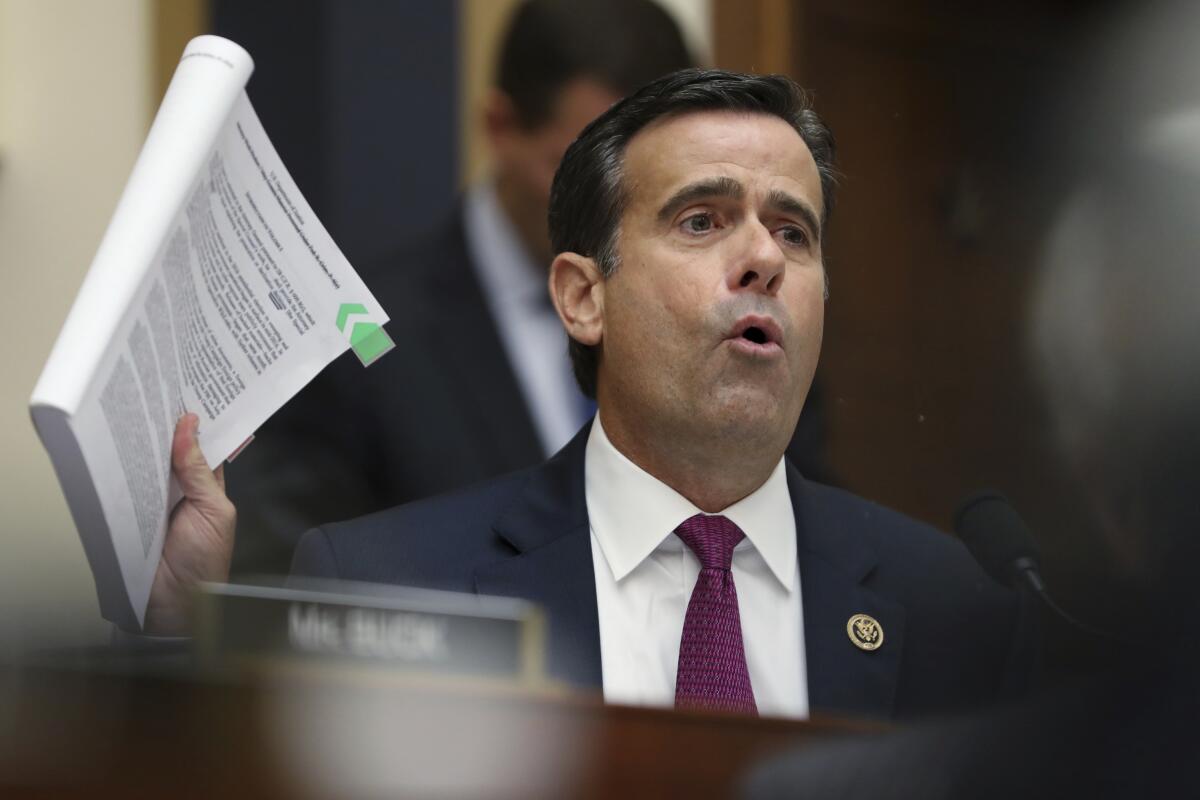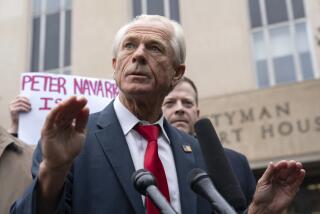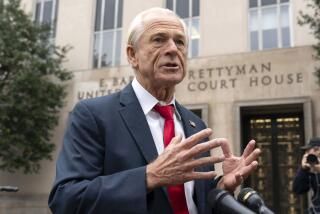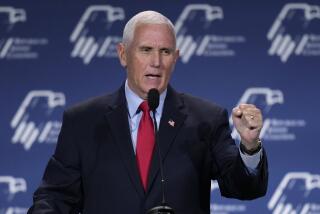Trump drops nomination of Rep. John Ratcliffe as intelligence chief

President Trump abruptly gave up his choice to serve as the nation’s next intelligence chief Friday, tweeting that Rep. John Ratcliffe of Texas, who had gotten minimal support from Republican senators, was being mistreated by the media.
“Our great Republican Congressman John Ratcliffe is being treated very unfairly by the LameStream Media. Rather than going through months of slander and libel, I explained to John how miserable it would be for him and his family to deal with these people,” Trump wrote on Twitter on Friday afternoon.
“... John has therefore decided to stay in Congress where he has done such an outstanding job representing the people of Texas, and our Country. I will be announcing my nomination for DNI shortly,” he added in a second tweet.
Ratcliffe, a vocal critic of Robert S. Mueller III’s special counsel investigation of Russian interference in the 2016 election, was announced last week as Trump’s choice to succeed former Sen. Dan Coats in the post of director of national intelligence.
But Republicans, many of whom were irked by Trump’s treatment of Coats, hedged on whether they would support Ratcliffe. In recent days, he drew controversy because of his apparent overstatements of his national security experience. Most notably, he claimed to have prosecuted a major terrorism financing case when he was appointed to examine why the first of two trials ended in a mistrial.
In another potential reversal, Trump said Friday that he might allow Sue Gordon, Coats’ deputy, to serve as the acting director. He had previously suggested that he would circumvent the line of succession and install someone else in the role, a decision that would have faced bipartisan resistance on Capitol Hill and within the intelligence community.
“I like her very much. I’ve always liked Sue Gordon,” Trump said. In fact, White House officials had been looking at ways to bypass her even though, by law, she would normally take over while a permanent replacement awaited confirmation.
He added that “certainly she will be considered” to serve temporarily in the role.
Although the president accused reporters of being unfair to Ratcliffe, he also told them that “you vet for me” when asked why his administration didn’t scrutinize the congressman’s resume before naming him.
“You save us a lot of money, actually,” he said.
James Jay Carafano, a Heritage Foundation foreign policy expert, said the Ratcliffe situation was indicative of Trump’s approach to personnel.
“He brings people in. If it doesn’t work out, you get rid of them and bring other people in,” he said.
The episode has created uncertainty around the intelligence director position, which was created after the Sept. 11, 2001, terrorist attacks to coordinate the nation’s many intelligence agencies and give the president nonpolitical advice. The director is, by law, supposed to have extensive experience in the field.
Critics of Ratcliffe, who was the mayor of a small Texas city before being elected to Congress in 2014, questioned whether he would be able or willing to provide facts to Trump that don’t match the president’s personal views.
Ratcliffe followed Trump’s tweets with his own, stating that he was “humbled” by the nomination but had asked Trump to remove him from consideration.
“I do not wish for a national security and intelligence debate surrounding my confirmation, however untrue, to become a purely political and partisan issue,” he wrote.
The withdrawal leaves Trump without a clear replacement for Coats. The president told reporters that he had a few options but did not name them.
Senate Intelligence Committee Chairman Richard M. Burr (R-N.C.) urged the White House to move quickly on another nominee.
“As the White House determines its next nominee, I’m heartened by the fact that ODNI has an experienced and capable leadership team to help see it through this transition,” he said, referring to the office of the director of national intelligence. “However, there is no substitute for having a Senate-confirmed director in place to lead our intelligence community. I remain committed to moving the official nomination through regular order once it is submitted to the Senate.”
Burr’s reference to the office’s leadership team appeared to be a signal to Trump about Gordon, a well-regarded intelligence professional who is considered politically independent.
Trump’s resistance to her had upset many Democrats and some Republicans.
“I think he’d be making a serious mistake. Sue Gordon is about the best you can get in terms of intelligence professionals,” said Larry Pfeiffer, who worked in the office when it was first created under President George W. Bush. “It just makes zero sense to appoint anybody other than Sue Gordon.”
Ratcliffe joins a growing list of people whom Trump has picked and then been forced to give up on — sometimes even before a formal nomination — after signals from Congress that the nominees would not be able to garner enough support for confirmation on Capitol Hill.
Trump frequently announces names without waiting for a formal vetting process, a practice that in some cases has opened his choices to humiliating public disclosures. In May, for example, Trump had to give up on nominating Stephen Moore to the Federal Reserve Board after disclosures about his personal finances and articles he had written that several senators said disparaged women’s economic advancement. A month before that, Trump dropped plans to name Herman Cain, the former Republican presidential hopeful, to the Fed.
Senate Minority Leader Charles E. Schumer (D-N.Y.) referred to those cases as he welcomed Ratcliffe’s withdrawal.
“Rep. Ratcliffe never should have been considered in the first place. This is part of a pattern from President Trump: nomination on a whim without consultation or vetting, and then forced withdrawal when a mess ensues — just like what happened with Herman Cain, Stephen Moore, [secretary of Veterans Affairs nominee] Ronny Jackson and many more. The next director of national intelligence must be someone who is nonpartisan, sees the world objectively and speaks truth to power.”
Times staff writer Jennifer Haberkorn contributed to this report.
More to Read
Get the L.A. Times Politics newsletter
Deeply reported insights into legislation, politics and policy from Sacramento, Washington and beyond. In your inbox three times per week.
You may occasionally receive promotional content from the Los Angeles Times.








